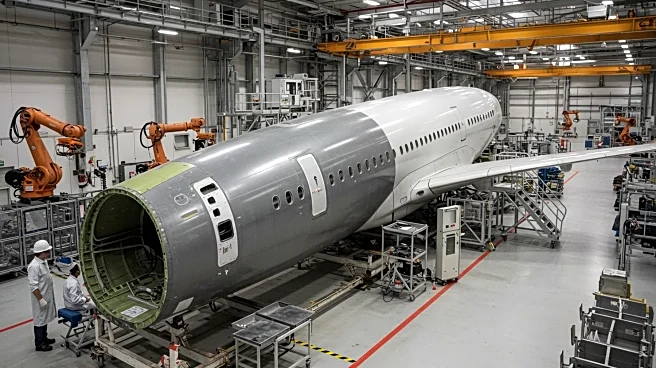What's Happening?
Airbus has achieved a significant milestone in its A350 freighter program with the delivery of the initial fuselage sections to its final assembly line in Toulouse. The sections, identified as MSN700, include central fuselage sections 15-21 and forward sections 11-14, which were produced at the Montoir-de-Bretagne facility, previously known as Saint-Nazaire. These components are supplied through Airbus Atlantic, the aerostructures division responsible for assembling and equipping all center and forward A350 fuselages. The delivery marks a crucial step in the A350F program, underscoring the industrial excellence and collaborative strength across Airbus's various facilities. Earlier this year, Airbus's UK plant at Broughton completed the first wing set for the A350F, further advancing the program.
Why It's Important?
The delivery of the initial fuselage sections for the A350F freighter is a pivotal development for Airbus as it seeks to strengthen its position in the freighter market. The A350F is designed to offer a 'best balance' for the freighter market, potentially providing a competitive edge over existing models. This advancement is significant for the aviation industry, particularly in the cargo sector, as it may influence market dynamics and competition. The successful progression of the A350F program could lead to increased demand for Airbus freighters, impacting global logistics and supply chain operations. Additionally, the collaboration across Airbus's facilities highlights the company's integrated approach to manufacturing, which could set new standards for efficiency and innovation in aircraft production.
What's Next?
As the A350F program progresses, Airbus will likely continue to focus on completing the assembly and testing phases to ensure the aircraft meets performance and safety standards. The next steps may involve further integration of components and systems, followed by rigorous testing to validate the aircraft's capabilities. Stakeholders in the aviation and logistics industries will be closely monitoring the program's development, as the introduction of the A350F could influence fleet decisions and operational strategies. Airbus's ability to meet production timelines and deliver on its promises will be critical in securing orders and maintaining its competitive position in the freighter market.










